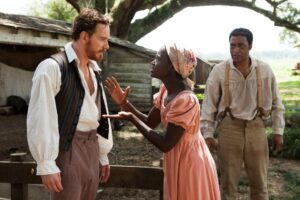Steve McQueen’s “12 Years a Slave” is the year’s most powerful film, an arthouse masterpiece which demands to be seen – and which will punch mainstream audiences in the gut.
McQueen may be the most distinctive filmmaker to emerge since Quentin Tarantino. But while this film deals with similar subject matter as “Django Unchained,” you couldn’t find a movie more opposite to Tarantino’s Oscar-winning tornado of a film or a filmmaker with a sensibility more in contrast to Tarantino’s.
Based on the true story of Solomon Northrup (Chiwetel Ejiofor), McQueen’s film tells the story of Northrup, a free black man in Saratoga, NY, in 1841. A musician, he is enticed to travel to Washington, D.C., by the promise of a windfall of high-paying work. Instead, his companions exploit him, then hand him over to slave traders, who kidnap him to Louisiana, where he is sold to a plantation owner.
By luck, his first owner, Ford (Benedict Cumberbatch), is thoughtful and refined. He recognizes in Solomon a cultured, intelligent person – but he can do nothing for him when Northrup reacts badly to a racist overseer (Paul Dano) and beats him. Though Solomon is spared from lynching (barely), he is marked for death.
Ford’s only recourse is to sell him to Epps (Michael Fassbender), a notoriously cruel cotton farmer. Epps weighs the cotton production of each slave daily, then whips the ones who don’t make their quota.
And there Solomon stays, trapped in brutal servitude, helpless to aid the female slave, Patsey (Lupita Nyong’o), who Epps uses as his sex slave (as well as a field hand). Northrup must learn subservience to survive, as well as how to handle both Epps and his cruel and jealous wife (Sarah Paulson).
Where Tarantino’s template often seems to be the exploitation film (taken to bizarrely talkative extremes), McQueen’s work is studied and disciplined, distinctive for its relentless patience.
This review continues on my website.

